T he T uf T s D aily
Q&A: University President Sunil Kumar discusses top priorities
Daniel Vos Executive News Editor
Sunil Kumar began his role as the 14th university president of Tufts on July 1, becoming the first person of color to serve in the position.
Formerly provost and senior vice president for academic affairs at Johns Hopkins University, Kumar also served as dean and the George Pratt
Shultz professor of operations management at the University of Chicago Booth School of Business and was the Fred H. Merrill professor for operations, information and technology at the Stanford University Graduate School of Business, where he worked for 14 years.
Kumar sat down with the Daily on Aug. 30 for the first time since beginning his role. He discussed the projects he's focused on, stu-
dent protests and how he’s getting acquainted with Tufts. Editor’s note: This interview has been edited for length and clarity.
The Tufts Daily (TD): First of all, welcome to Tufts! What has the reception been like these past few months?
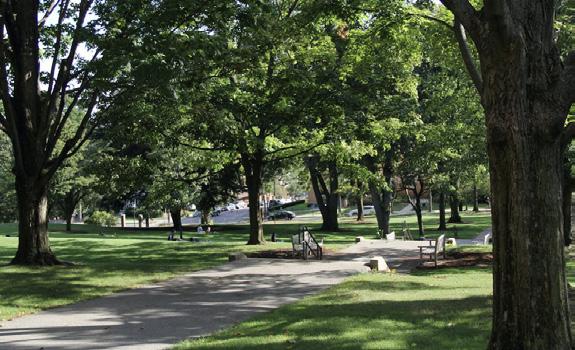

Sunil Kumar (SK): It’s been outstanding. People had repeatedly told me how nice a community Tufts was, and it’s exceeded
University offers scholarship in response to RAs’ demands for stipend
Aaron Gruen Editor in Chief
Negotiations between Tufts and United Labor of Tufts Resident Assistants resumed on Thursday, with the university proposing compensation in the form of a $600 semesterly scholarship in addition to 80 meal swipes per semester.
David Whittingham and Anisha Uppal-Sullivan, RAs who sit on the union’s bargaining committee, left the meeting feeling that they made progress.
“I think yesterday was really great,” Uppal-Sullivan, a junior, told the Daily on Friday. “We do think that [the scholarship] number is too low for the amount of work that we do, but we think we’re finally making progress towards something real.”

The bargaining session on Thursday began at 1 p.m., with around 70 students, mostly RAs, attending in support of ULTRA. At the onset of the session, which ran for six hours, the university counterproposed RAs’ demands for a cash stipend with an offer for $500 semesterly scholarships.
After the figure was proposed, the bargaining committee raised questions about the scholarship,
particularly its name and function as opposed to a stipend.
Dana Fleming, associate general counsel for the university, described the scholarship as a “neutral check in hand” during the meeting.
When asked by the Daily to clarify the difference between RAs’ proposed stipends and Tufts’ proposed scholarships, the university declined to comment. Patrick Collins, executive director of media relations, wrote in an email that the university is committed to bargaining in good faith but “will not comment on specific proposals away from the table.”
During a break in negotiations on Thursday, sophomore Jasmine Zoha, an RA, reacted to the university’s scholarship proposal.
“The switch to using the word ‘scholarship’ threw us off. … I don’t know if that was intentional on their part to throw us off, but the word ‘stipend’ is what is usually used by other schools, so it was kind of weird to hear,” she told the Daily.

The university’s offer of scholarships came two days after RAs picketed while first-year students moved into their dorms. RAs voted to authorize the strike after the university rejected their demands
for compensation in the form of a stipend.
While unanswered questions about the university’s proposed scholarship have caused concern amongst RAs, Uppal-Sullivan also said “there was a positive reaction to the fact that we could get the ball moving on some of these issues.”
In addition to the scholarship proposal, the university’s latest proposed compensation package for RAs includes 80 meal swipes per semester in addition to three meals per day for the period RAs are on campus before first-years move in.
The university also agreed in principle to the union’s request to modify the process by which RAs are discharged from their positions, entitling RAs to a meeting with a representative of the Office of Residential Life before job dismissal.
Currently, the union is doing their own research to try to understand the implications of a scholarship, according to Uppal-Sullivan. In particular, she said, ULTRA wants assurances that scholarships will not affect other benefits RAs receive, including federal work study and current financial aid offers.
see UNION, page 2
all expectations. There’s some secret sauce here that makes people warm, welcoming, kind and vibrant, so it’s been very nice. And I had probably the best welcome gift possible, a night I’ll never forget: I got to throw out the first pitch for the Red Sox. That was a big deal for me and my wife. There was no other way I would get on the field of a Major League team.
TD: Entering office, what are your top priorities?
SK: I’m in week seven, so it’s not like I have fully formulated plans and positions on a lot of the topics we’re going to talk about; but I do want to say, in general, and I’ve said this before, there are four areas that I think of as kind of as broad priorities — or pillars, if you will.
One is increasing access to Tufts. We have done well so far,

French program unveils new cultural studies major
Editor


Tufts’ Department of Romance Studies will offer a new French & Francophone cultural studies major, in addition to a French Literary Studies track this Fall. The new major reflects a push within the department to teach languages from a broader, more worldly perspective, moving away from their primary focus on written works.
“Understanding French culture is much richer … than how it has been taught, or had been taught. And I think we were a little behind,” Nina GerassiNavarro, chair of the Departme nt of Romance Studies, said.
“The [French cultural studies] track … is really a shift from an overdetermined focus on literature.”


French is the second program within the Department of Romance Studies to offer a cultural studies track, with the Spanish program being the first to do so in fall 2018, according to Gerassi-Navarro. French professor Anne-Christine Rice
noted that the need for a new major became clear to French teachers after they surveyed their students last year.
“Mostly what we found was that [French students are] interested in a broad variety of courses,” Rice said. “They are interested in literature, but they are also interested in history, art history, music, politics, [international relations]-related courses, food systems, sustainability, all kinds of different topics. That really helped us decide that we need to offer a broader array of courses, taught in French, but that can tie in with their other interests.”
Junior Ryan Stolarz, who plans to major in French & Francophone cultural studies, spoke to the advantages of studying French through a more comprehensive lens.
“In high school, my French classes were all … heavily literature based,” Stolarz explained. “So when I came to Tufts, and I was doing that again, it wasn’t necessarily a bad thing, but it would be cool if I could do class-
see FRENCH, page 2
Tuesday, September 5, 2023 VOLUME LXXXVI, ISSUE 2 Medford/Somerville Mass. THE INDEPENDENT STUDENT NEWSPAPER OF TUFTS UNIVERSITY EST. 1980
TUFTSDAILY THETUFTSDAILY TUFTSDAILY THE TUFTS DAILY THE TUFTS DAILY DAILY@TUFTSDAILY.COM Features News 1 Features 4 6 Fun & Games 8 Opinion 9 Sports 12 page 4 page 9 page 12 Internship intrigue A letter from the editor in chief Men’s soccer sets sights on success Opinion Sports JOIN US! SCAN THE QR CODE OR VISIT TUFTSDAILY.COM/TIPS Arts & Pop Culture GRAPHIC BY BEX POVILL
see KUMAR, page 3
UNIVERSITY UNIVERSITY UNIVERSITY
Estelle Anderson Deputy News
The Tufts Daily is the entirely student-run newspaper of record at Tufts University in Medford, Mass. An editorially and financially independent organization, the Daily’s staff of more than 100 covers news, features, arts and sports on Tufts’ four campuses and in its host communities.
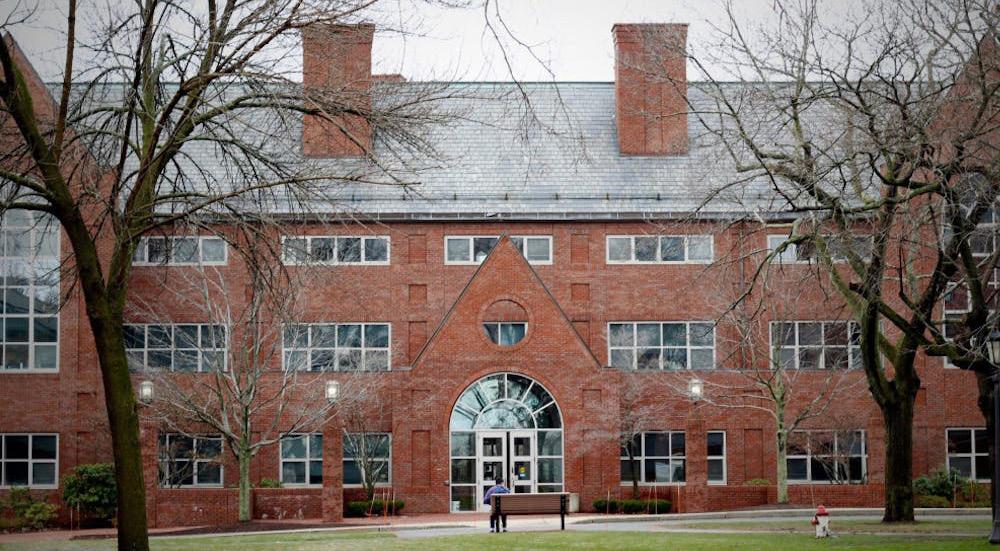
University offers RAs a semesterly scholarship along with 80 meal swipes per semester
UNION continued from page 1
Whittingham pointed out that money in the form of a scholarship could potentially be advantageous as opposed to a stipend, depending on how each form of payment would be taxed.
“If it is a stipend, it’s a taxable stipend, and that will be taken into account in financial aid,” Whittingham said. “There are certain ways in which [the scholarship] actually could be better. It’s just something that I think we need to look into more.”
The next bargaining session between the university and ULTRA will occur on Friday, Sept. 8. Whittingham said the union will continue to push for higher compensation, but acknowledged that the scholarship “at least appears to be money on the table.
French department’s new cultural track moves away from written works
es on French food, or the culture in some other way, rather than learning about 19th and 18th and 20th-century poetry and literature. I think variety just [makes] learning French a lot more comfortable and appealing.”
The flexibility of the cultural studies track also makes it easier for students to fulfill their requirements if they are double majoring or studying abroad.
will still have to fulfill the same three requirements as French Literary Studies majors: “Composition and Conversation II,” “Readings in French Literature I” and “From Romanticism to the TwentyFirst Century in French Literature.” From there, they must take seven courses in advanced language, culture and/or literature, such as a class on the effects of migration on contemporary France
ship, we talk of being interconnected and international, but if you don’t understand a little bit of the culture and the history and the way different cultures look at things, you can’t really advance.”
Through the new French & Francophone Cultural Studies major, the department aims to continue building stronger connections across the four romance studies programs: French, Spanish, Italian and
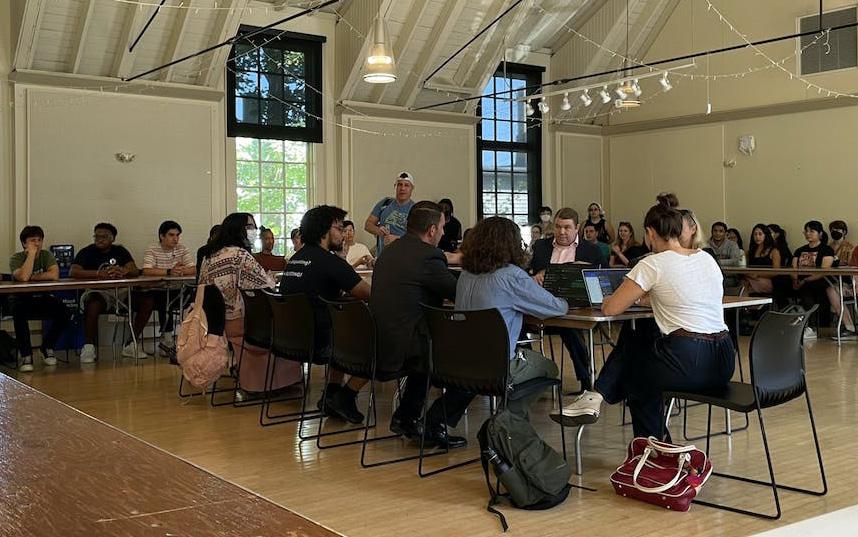
have six continents, because North America and South America are considered one continent. … What do we do with these two different knowledges?” Gerassi-Navarro asked.
“One is not better than the other, they’re different. … We as a department can offer a space to bring those connections and differences together and help think about it, because that’s what I think is what we really need today.”
The Tufts Daily office is located on the colonized land of the Massachusett people and within the territories of the Nipmuc and Wôpanâak (Wampanoag) tribes.
Story tips? Questions?
Concerns?
Let us know!
“I studied abroad and a lot of my friends did as well, and if you study abroad, sometimes you take French classes that don’t quite fit into the literature category,” senior and French major Sofia Grose explained. ”But if you switch to the French and Francophone studies major, then you can count those classes abroad more easily.”
Students who go down the cultural studies track
or a new course on colonization and decolonization in the French-speaking Caribbean.
Gerassi-Navarro explained that adding “& Francophone” to the name of the major was essential to make room for voices beyond France.
“The French culture track … it’s not just France. It’s Canada. It’s Haiti. It’s Martinique. It’s north and sub-Saharan Africa. I mean, it’s huge,” she said. ”We talk about global citizen -
Portuguese. Gerassi-Navarro hopes that students will embrace opportunities to study how these cultures both come together and converge — analyzing, for instance, the variations between AngloCaribbean, French-Caribbean and Spanish-Caribbean perspectives, or comparing France and Spain’s relationships with Haiti.
“In English, we have seven continents. But in Spanish, we
Ultimately, the French & Francophone cultural studies major is an opportunity to broaden the definition of “French,” making way for new narratives.
“By creating a culture track, you’re legitimizing that this is important, just as the classic text,” Gerassi-Navarro expressed. “These new voices that are emerging, this new way to look at culture, is just as important.”
NEWS 2 TUESDAY, SEPTEMBER 5, 2023 THE TUFTS DAILY
Visit tuftsdaily.com/tips P.O. Box 53018, Medford MA, 02155 T he T uf T s D aily Aaron Gruen Editor in Chief Henry Chandonnet Kaitlyn Wells Managing Editors Julia Carpi Caroline Vandis Associate Editors Olivia White Production Director Ryan Sorbi Business Director Daniel Vos Elizabeth Zacks Carl Svahn Julieta Grané Arielle Weinstein Tvisha Goel Chloe Courtney-Bohl Julia Shannon-Grillo Nina Zimmerman Chloe Nacson-Schechter Clint Chen Yena Ryoo Avril Lynch Bex Povill Guillem Colom Elizabeth Foster Merry Jiao Marlee Stout Sam Berman Ty Blitstein Max Antonini Meghna Singha Megan Amero Siya Bhanshali Ella Dovey Mike Kourkoulakos Rachel Liu Executive News Editor Executive Features Editor Executive Arts Editor Executive Opinion Editor Executive Sports Editor Executive Science Editor Investigative Editor Executive Editorial Editor Executive Audio Producer Executive Video Editor Executive Photo Editors Executive Graphics Editors Intentionality & Inclusivity Chair Education Chair Social Chairs Alumni Liasons Executive Layout Editors Executive Copy Editors Executive Social Media Managers Executive Newsletter Editor EDITORIAL MULTIMEDIA COMMITTEES PRODUCTION BUSINESS
Acknowledgement
Founded in 1980 Land
AARON GRUEN / THE TUFTS DAILY
The negotiation session between Tufts and resident assistants is pictured on Aug. 31.
ALEX SERINO / THE TUFTS DAILY
The Olin Center is pictured on Nov. 27, 2018.
FRENCH continued from page 1
but there’s more we can do. It’s not only for the undergraduate program, but also for graduate programs as well. The second one is the student experience. While students are here, it should be a transformative experience. I want to not just say that the experience should be transformative and that they should be able to explore broadly, I want to make sure those opportunities exist.
The third is, I believe a university like Tufts needs to do more than its fair share in addressing some of the world’s problems and to that regard, expanding our research footprint, and [fourth], faculty is something on my mind as well.
TD: What aspect of being president are you most excited about?
SK: My wife is fond of saying that I’ve never had a real job. Since age 18, I’ve been on a college campus. I love all aspects of the university’s operation, from attending the homecoming game, to talking to the veterinary school dean on how to expand the veterinary hospital, to thinking of the future of the university as a whole. I’m interested in all of it and in this position I get to influence, to some extent, all of those decisions and participate in all those activities. It’s the breadth that I think excites me the most.
TD: At Johns Hopkins, you focused on improving students’ encounters with university services, and advancing diversity, equity and inclusion across the university. Are there any similar projects you’re pursuing at Tufts?
SK: One of the things we worked on at Hopkins was making the ability for our undergrads to take classes at other schools easier. As a goal, I absolutely would like to pursue that at Tufts. Similarly, with the DEIJ goals, again, I would very much like to pursue those. What exactly should they be? What form will the project take? Well, in week seven, you shouldn’t trust anybody whose got those answers. So I’m still in listening and learning mode, but I will pursue both those directions for sure.
TD: Over the past few years, the Tufts community has debated about the role of student protest, more specifically about the appropriate forums for demonstrations. What is your view of the role of student demonstration on campus, and do you believe there are better or worse forums for protest?
SK: For me, the philosophy is simple. Universities need to be tolerant of protest more than almost any other organization in society. A university is a place where raising your voice to make sure it’s heard is seen as a good thing, and I see it as a good thing. But raising your voice so that others are not heard is not such a good thing. If you see me sitting in the front row of a speaker seminar, it means nothing more than [that] I’m there to listen and learn — kind of a fundamental act in a university. It doesn’t mean I’m
endorsing the speaker. It doesn’t mean that I acquiesce to their ideas. So for me, maybe I’m panglossian, maybe I might be idealistic here, but for me, almost everyone is worth listening to and we can learn from them.
The reason I use “almost” is, of course, there are people — provocateurs, if you will — who speak solely to provoke and solely to
done, so that’s a statement in the past tense. Second, we do intend to build housing on campus to alleviate the pressures on the city. I agree with you that we have more people, but I see our role, like I said, as not expanding into the community as much as taking care of those people in a way that doesn't harm the community. And that will take a few years.
figure out how best to communicate what it is we are doing. But for now, all I can say is I’m confident we’ll end up in a good place.
TD: I also wanted to ask, what are the university’s plans right now regarding legacy admissions?
SK: As you know, there was a task force set up by the deans to look into this. I see legacy admissions as being one more component and,
need to not just engage with the situation but to alleviate it.
The second responsibility is, through our research, to come up with solutions, especially in those areas where Tufts has a particular advantage. I’ll give you two examples of where we do have particular advantages. One is blue tech; off the New England coast we are actually working with a fairly substantial consortium of universities and other organizations to work with the state of Massachusetts as well as the rest of New England to see how best we can deploy wind power in a way that will be least impactful on the deleterious impacts and yet generate a significant amount of power.
So that’s an example where we are acting in the here and now. The third is, as my predecessor has already committed us, as an institution getting to our net zero goal, we are a large institution and large consumer of power and energy and we need to get to our net zero goals as soon as practicable.
TD: Looking back, what are your proudest accomplishments in your career and in general?
spread hate and hurt. For those people, the norms of our community do not permit. But short of that, protest with intent to get a point across is a good thing. Protest intended to prevent other people from speaking in general, I don’t see as a good thing.
TD: As Tufts expands its presence across Medford and Somerville, how do you see its relationship with our host communities?
SK: We have to be good neighbors in every sense of the word. One thing that good neighbors do is they help each other out when necessary. And one of the examples of that is that my predecessor did a fantastic job during [COVID-19] helping the communities of Medford and Somerville. Right now for example, we are leasing some of our buildings in Somerville so that they can house a public school there, so I think a mutually beneficial relationship is a good thing. You brought up the word expansion, and I don’t think Tufts intends to necessarily expand into the community; it is, how best can we interact with the community, and how can we do that better than we are doing now?
TD: If I can push back a little bit on that, Tufts intends to grow its undergraduate population, and having more students in the area has already been disruptive to people in Medford and Somerville in terms of the housing market. That’s also something that Tufts has said that they plan to address.
SK: Two things: One, at least for the medium term, Tufts’ expansion of the undergraduate program is
TD: On the note of increasing access, one of your four goals, I wanted to address the Supreme Court’s recent decision to outlaw affirmative action in higher education. The same day the decision came out, Tufts announced that a working group and an executive strategy group were assembled to create a plan and response. What are the university’s current strategies to preserve diversity in light of this decision?
SK: I was one of the signatories of that letter that came out so we had obviously prepared for the decision in advance. To be precise, what the Supreme Court did was to outlaw the explicit use of race in admissions. Three things: One, our commitment to diversity has not changed. Two, it becomes a question of how best can we live up to our commitment for diversity, continue to have diverse classes and perhaps more diverse classes. And three, of course, comply with the law. This is complicated and we’ve got to do this in a way that takes into account both the Supreme Court decision but our own aspirations as an institution. That’s why we created the task force and we did it with a carefully selected group of people. In fact, if you look at the task force, it’s not unique to Medford and the undergraduate program. It’s broadly across all schools, because this is a decision that affects all schools. Their deliberations are underway and I don’t want to speculate on what they will come up with — it’s too early. When they do come up with something we’d be happy to re-engage with The Tufts Daily to
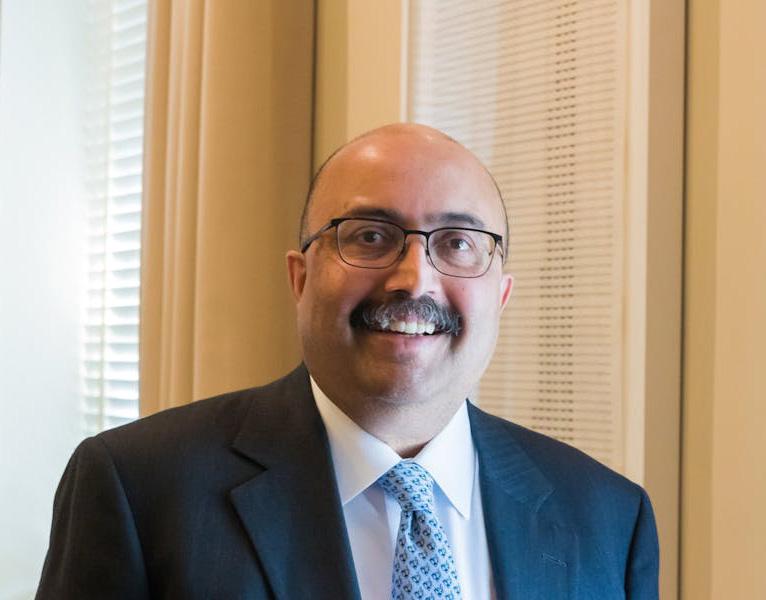
in fact, connected to the Supreme Court decision. So the Committee on Inclusive Access, which is the committee that’s been set up to do this, will come up with strategies which I suspect will have bearing on the legacy issue as well. That is, they are not disconnected and JT Duck, our admissions person, agrees that they’re not disconnected.
I think we will holistically come up with a new set of policies on what we do. And while I don’t want to speculate on where exactly we will end up, or when we will do that, I don’t want too many admission cycles to go by before we have resolved this either.
TD: Pivoting to one of your pillars, Tufts as a global institution with responsibilities to the world, this summer was one of the planet’s hottest on record, and climate change is at the forefront of issues facing every institution. How is Tufts meeting this moment, and what advice do you have for members of the Tufts community who are living through this unprecedented era?
SK: Let me first say what I think of as Tufts’ responsibility here: It is to pursue those avenues where it will have the most impact on this very pressing problem. So this is a sufficiently pressing problem that you want to pursue those avenues that are maximally impactful. One of them is related to your second question, which is one way in which we will be impactful is by educating responsible leaders. So we have to make sure that our educational footprint in this space is robust, innovative and equips you all with the tools you
SK: I have this unbelievably privileged job where I get to count all your achievements as mine. I just have to say “Oh, he was a student, he interviewed me for the newspaper.” I was thinking about this. And I said it’s simple: It’s what some of my students have done. They’ve gone on to do terrific stuff. I’m just going to claim that those are my proudest accomplishments. On a more serious note, the fact that I even got to interact with them is such an incredible privilege for me.
TD: Are there any Tufts traditions or rituals that you’re looking forward to?
SK: I don’t actually know them all, that’s the problem, I've got to figure this out by myself. So I’m actually most looking forward to figuring these traditions out myself. In particular, I am curious, and you don't have to answer this now, but what happens to Jumbo’s statue during Halloween?
TD: I don’t think anything happens.
SK: Isn’t that a missed opportunity?
TD: We know it's only been a few weeks, but do you have a favorite spot on campus yet?
SK: [Kumar points to the President’s Lawn] Right here! My wife and I sit just outside our kitchen, and we love the fact that especially on Saturday mornings, people are walking their dog, they’re playing, they’re having a picnic and we don’t even have to move to be part of all that. We can sit outside our kitchen and watch all that. We love the President’s Lawn which is why in my matriculation speech, I was trying to convince them that one tradition that maybe we’re starting is the great snowball fight on the President’s lawn.
NEWS 3 TUESDAY, SEPTEMBER 5, 2023 THE TUFTS DAILY
KUMAR
1
continued from page
Kumar shared his thoughts on Tufts traditions, the role of student protest and more in an interview with the Daily
AARON GRUEN / THE TUFTS DAILY
University President Sunil Kumar is pictured in his office on Aug. 30.
The summer internship: Was it worth it?
Carmen Smoak Deputy Features Editor
During the arduous week of final exams before summer break, students are likely devoted almost entirely to one feat: finishing out the semester. But what comes after all finals are taken and projects turned in?
Summer often presents itself as a season of opportunity. There is time to relax, see family, travel, work and maybe even tack on a few items to ye olde resume. With so many possibilities, students take advantage of a wide range of summer employment opportunities.
But what is the best use of this “gift” of time over the summer? Some students feel pressure to apply for a plethora of internships in hopes of advancing their careers early. These internships can bring many benefits, but some can also be monotonous and demanding compared to other summer employment options.
This begs the question: Is the summer internship worth it?
First, it’s important to note that there are many types of internships. Christy Yee, a junior at Tufts, channeled her passion for minority mental health care into an internship with Anise Health, a mental health startup with six staff members.
“I chose to work there, or do an internship there, because their mission is really aligned with what I want to do … I’m a clinical psych major and I want to be a therapist eventually,” Yee said. “It was really good working with a smaller team and being able to suggest something and
then have it implemented right away or have feedback on it.”
Motivated to explore a topic she is invested in, Yee applied and obtained funding for the internship through Tufts Career Center’s summer internship grant program. This gave Yee the opportunity to receive financial compensation even though Anise Health did not have the funding to pay her for the summer.
“I worked with [Tufts and Anise Health] to kind of create this role for me because it’s just like a winwin,” Yee said.
Beyond funding and personal passion, there are many factors that go into choosing a summer internship. During the COVID-19 pandemic, many internship opportunities transitioned to remote work, but the Career Center has seen this trend reverse.
Susan Atkins, associate director of alumni career services at the Tufts Career Center, wrote in an email to the Daily, “The Career Center saw a shift toward remote internships during Covid, but that has now shifted back to in-person and hybrid options.”

While remote internships offer an opportunity for students to intern for companies based all around the United States and the world, they can also be isolating. Yee elaborated on her fully remote internship experience.
“It was definitely a little bit isolating just because you don’t really get to talk to your teammates other than during meetings, and then that’s only really a couple minutes of casual talk and then you get into whatever [work] you’re talking about,” Yee said.
Junior Sam Youkeles echoed this sentiment, noting that internships can provide a chance to figure out what mode of work is most suitable.
“Maybe I can get a better sense of what I enjoy doing — if I prefer to work in an office versus remotely — before I actually enter the working world,” Youkeles said.
At the end of the day, working remotely or in person as a summer intern is a valuable learning experience. Youkeles spoke of his experience as an IT operations intern at Workiva and the skills he learned during his time there.
“I feel like [Workiva] did a very good job of introducing me to topics that I was unfamiliar with and teaching me as I worked. And I learned a lot of skills that I wouldn’t have learned in school,” Youkeles said.
The opportunity to learn skills not seen in the classroom and gain exposure to all sides of the mental health industry was valuable to Yee.
“I think seeing the business end [of things] was really interesting and something I wouldn’t have been able to experience otherwise,” Yee said.
Overall, internships provide an opportunity for exploration, which can sometimes lead to valuable lessons of what students do not want to pursue after graduation.
“I guess a con [of internships] would be that you’re putting in a significant amount of time, just to discover that the thing that you’re working on is … not really going to be super fulfilling for you in the long run,” Youkeles stated. “Which I guess is a con, but it’s also a pro because I’ve discovered that fact about myself now.”
Discovering what you do and do not want to invest your time in in the future is one of the main takeaways students can obtain from internships. Yee spoke to how her internship has helped her with future planning.
“I am very glad and grateful that I did this internship, and so just taking that and knowing where I want to go next,” she said.
Internships often function as just that, a building block for what comes next in a student’s career. With the future uncertain, these building blocks can feel heavy. Many students experience a feeling of pressure and stress to find a summer internship.
“Everyone always talks about internships,” Youkeles said. “A significant amount of people get internships. It’s not like everyone does, but especially in computer science, you know, the standard is to be getting summer internships, I guess, after sophomore year. I’m saying that that’s the standard, but it’s really not — people shouldn’t feel pressured to be getting an internship then, because it’s not easy to.”
For students who do seek a summer internship, they can find that competition is high for job postings.
“I mean, as a sophomore in college, especially in computer science, it’s pretty hard to find internship opportunities because there’s so much competition,” Youkeles said.
Adding weight to the situation is the importance of internships as resume builders and tools for future job connections.
“According to the Office of Institutional Research, approxi-
mately 20% of respondents to the Class of 2022 Senior Exit Survey who accepted a job indicated that they learned about the position through a previous job or internship,” Atkins wrote.
Are these internships worth the pressure? Both Yee and Youkeles stated that they were happy they did their internships, and took some lessons away with them.
When asked about advice he would give to students considering summer internships, Youkeles stated that it’s better to find a fulfilling and enjoyable experience rather than feel pressured to find the perfect internship.
“It’s very much just exploring and figuring out where [you are] without pressuring yourself too much,” Youkeles said. “But at the same time, it’s definitely worth pushing yourself to find these opportunities because I know that I had to put myself out of my comfort zone in order to get this internship.”
At the end of the day, summer internships are a great way to gain exposure, learn how to work in various work settings, strengthen skills and make important connections; however, they are not the “make-or-break” experiences that many people make them out to be.
“I think there’s a lot of pressure around summer internships and just internships in general,” Yee said. “I think trying to remember that, at the end of the day, it is an experience for you, and it’s not the end of the world if it’s not [one of] the top ten internships in the world or it’s not exactly what you want, because I think no matter where you are, you can learn from [any] experience.”
FEATURES 4 TUESDAY, SEPTEMBER 5, 2023 THE TUFTS DAILY
F EATURES
Groundwork Somerville cultivates community with August Harvest Festival

There’s an entire culinary world that I’ve never really met before,” Mabington said.
The words “Our food holds our story,” are painted onto the murals flanking the flourishing green space on South Street Farm, also known as Somerville’s only urban farm. Run by Groundwork Somerville, an environmental justice non-profit, the farm and the words that grace its border walls fuel the organization’s efforts of cultivating a healthier Somerville.
On August 27, Groundwork Somerville hosted its inaugu-
It is the learning Mabington described that incentivizes Groundwork’s programs. Through the farm and community participation, Groundwork stands as a pillar of learning and growth for the entirety of Somerville.

“My biggest goal for [the harvest festival] is encouraging more community engagement by bringing together all the different sides of Somerville that exist but don’t necessarily engage on a
lenges are one that Groundwork tackles earnestly, deploying techniques such as vertical growing beds, intercropping and soil rehabilitation to effectively produce around 2000 pounds of food each season. The organization specializes in growing culturally relevant produce such as okra, bitter melon and malabar spinach to serve the needs of Somerville’s diverse population.
Leah McCarthy, Groundwork Somerville’s Farm Manager and Educator, highlighted the work that goes into integrating growing spaces into the community.
nearest grocery store. Additionally, areas with higher levels of poverty are more likely to be impacted, and in Massachusetts alone, 2.8 million residents living in low-income areas lack access to grocery stores.
Groundwork Somerville seeks to combat food deserts and inequities by providing food at a reduced cost to underserved areas in Somerville, partnering with other food justice non-profits such as Project Soup and pairing with the Somerville Mobile Farmers Market.
During the pandemic, Groundwork provided food to the
with state officials and developers to find a new location for the farm.
Saladin Islam, Groundwork’s vice president of the board of directors, explained that South Street Farm will stay in its current location for a few more years.
Islam added that the location for the new farm will be a hustling and fully developed area with a lot of traffic. “It makes it even more important for us, who support low income communities and give back to our mentor farmers to be in that area to represent Somerville,” Islam explained.
ral harvest festival celebrating the end of this year’s growing season. Spearheaded by Tufts senior Zoe Garderet, the festival included a number of learning booths at which attendees could practice making grilled corn, fermented foods, jam and salsa. Additionally, attendees were greeted with a full lunch spread made from the farm’s own produce and entertainment from one of Tufts’ student bands. Festival goers included a broad scope of Somerville residents of all ages, from the city’s elderly to its robust student population.
Attesting to the festival’s diverse activities were the student volunteers from Tufts’ own FOCUS pre-orientation group. Mathew Mabington, a Tufts first-year, recounted his experience working at the festival’s fermentation station. “It was cool learning new things that I had never learned otherwise …
daily basis,” Garderet, who was a summer intern at Groundworks Somerville, explained. “In my ideal world, the takeaway from the event would be that everyone would be more actively engaged in the community and learn about the ways you can help others who don’t have access to affordable, fresh food [in addition] to just learning about the beautiful world of urban farming and urban green space.”
Groundwork has existed in Somerville since 2000, with South Street Farm opening around a decade later. Due to the urban nature of the farm, South Street stands as a robust example for what it means to both address food insecurity and nurture green space in an urban environment.


As a result of the pollution and lack of space that accompany city-life, urban farms face a set of unique challenges. Yet these chal-
“Our farm is, actually per square foot, much more productive than a traditional farm … That’s because of the amount of labor that goes into each square foot of the farm,” McCarthy explained. “Because we produce everything organically … there’s a lot of weeding, a lot of trellising, we focus on growing vertically, [and] taking care of our soil footweb so we can really rehabilitate the soil and make sure we’re taking care of the ground in a way that allows us to produce as much food as we can.”
While South Street Farm is the crux of Groundwork Somerville’s efforts, its output is not the organization’s full reach. Throughout the United States, there are a number of food deserts, which are areas with limited access to affordable food.
The U.S. Department of Agriculture defines urban food deserts in areas in which at least 33% of the population lives over a mile from the
at-risk populations unable to venture to grocery stores. Groundwork additionally crusades against food inequities through early learning education, and by fostering student gardens at schools across the city of Somerville. Tufts students might also recall the work that Groundwork does on campus every year with its Maple Syrup Project.
Despite Groundwork’s reach, the organization is facing additional changes as a result of Somerville’s continued development. The Green Line extension, and the ensuing landscape changes, have necessitated the move of South Street Farm. Currently, the farm sits between an expanding biotech lab and lots destined for residential development. Evolving city plans have resulted in the farm’s eventual displacement, yet Groundwork and its board fortunately continue to work
“And ultimately, once we do move, [we’re] hopefully going to put in measures where we work with community land trusts to make sure something like this doesn’t happen again.”
As Groundwork Somerville continues to serve the city, telling the stories of Somerville’s unique population through food justice and education, residents can become involved with the organization through volunteering and attending events such as the Harvest Festival.
“We’re working on maintaining and growing our presence in the community, being a space where people can gather, have fun, and celebrate their food and their culture,” McCarthy said. “I want to make clear that, especially with [the Harvest Festival], what we’re trying to do is let people know that we’re here and that this space is always going to be a space that accepts all kinds of people.”
FEATURES 5 TUESDAY, SEPTEMBER 5, 2023 THE TUFTS DAILY
Layla Kennington Features Editor
LAYLA KENNINGTON / THE TUFTS DAILY ARCHIVES
Harvest Festival is pictured on August 27, 2023.
A RTS & P OP C U l TURE
Shows to watch during the actors and writers strikes
 Odessa Gaines Arts Editor
Odessa Gaines Arts Editor
If you have been keeping up with film and television news for the past few months, you may be aware of the labor disputes going on in Hollywood with the Writers Guild of America and the Screen Actors Guild-American Federation of Television and Radio Artists.
On May 2, 2023, the writers strike officially began with over 11,000 screenwriters moving to the streets of Hollywood to protest studios’ unfair labor contracts. On July 14, 2023, SAG joined the writers on the picket line. With both strikes still ongoing, numerous TV and film productions have shut down. Some productions remain active as they are international and thus may not be under WGA and SAG-AFTRA strike regulations.
An important thing to note is that as this strike is ongoing, the impact felt by consumers will grow as more time passes. One of the first clear signs of the strike seen by viewers was late-night shows going dark. The next was the lack of actors promoting their movies and shows, such as when the “Barbie” (2023) cast ended promotions on July 13. The next big impact
is already starting to emerge, as some of the paused productions are being pushed back and new work is being held back. With these developments, we can anticipate fewer new shows hitting our screens in 2024 and possibly beyond.
If you’re worried you won’t have anything to watch during the entertainment drought, try these classic and completed shows:
“Law and Order: Special Victims Unit” (1999–)
Originally a spin-off of “Law and Order” (1990–2010, 2021–), “Law and Order: Special Victims Unit” is a show for the ages. After recently concluding its 24th season, the show has announced a return for season 25, and with already over 500 episodes to date, this is an easy long watch for anyone.
Following the Special Victims Unit in New York City’s police department, the show follows the squad of detectives and their ability to solve cases of sexual assault. With countless famous guest stars from Hilary Duff to Robin Williams, SVU has put out astonishing episodes to boot in its decades-long runtime.
Stream on Hulu and Peacock.
“Pretty Little Liars” (2010–2017)
If you’ve watched any of Mike’s Mic’s iconic YouTube vid-
eos, you may already know that “Pretty Little Liars” is one of the most unhinged shows to date. A year after their friend Alison goes missing, Aria, Hanna, Spencer and Emily come back together to start piecing together what really happened the night of September 1, 2009 while being hindered by “A,” an anonymous person who threatens to expose their deepest and darkest secrets and lies. A mystery drama surrounding a group of friends throughout their high school and postcollege years, this show will have you gasping at every reveal, yelling at every relationship and cackling at every other Hanna Marin line.
Stream on Max.
“One Piece” (1999–)
Pirates? Magic fruit? Crazy powers? What’s not to love in a
show that has all this and more?
“One Piece” follows Luffy, a boy who gains a rubber body after eating the mysterious “Devil Fruit.” He hunts for a famously hidden treasure after putting together his pirate crew, aptly named the “Straw Hat Pirates,” thanks to Luffy’s own hat. The crew sails about the Grand Line ocean path in search of the One Piece treasure as Luffy aims to become the Pirate King. With currently over 1000 episodes, this anime is sure to last a viewer through an entertainment drought.
Stream on Netflix and Crunchyroll.
“Sabrina the Teenage Witch” (1996–2003)
Before there was “The Chilling Adventures of Sabrina” (2018–2020), there was “Sabrina
the Teenage Witch,” a sitcom starring Melissa Joan Hart as Sabrina Spellman. On Sabrina’s 16th birthday, her aunts reveal to her that she is a half-witch. She soon begins to learn to use her powers, but her spells backfire and go wrong frequently. As she learns to balance her mortal life with her witch life, Sabrina comes into her own as a young adult, exploring friendships, romance, college and the work life. Oh, and there’s a talking cat.
Stream on Hulu.
“Schitt’s Creek” (2015–2020)
One of the best comedies of our time, “Schitt’s Creek” rounds out the list for shows to watch (and rewatch). When the once wealthy Rose family loses all their money to an embezzlement scheme, they have to pack up and move to the singular asset they still hold — a small, rundown town named Schitt’s Creek that the family had bought as a joke. With iconic characters and running gags such as Alexis Rose’s constant involvement in life-threatening situations, this show will have you quoting its jokes religiously. The well-rounded cast and their chemistry is enough to make you love this comedy from episode one.
Stream on Hulu.
Sabrina Carpenter and The 1975: Lollapalooza’s two stand-out acts
Ryan Fairfield Arts Editor
There’s something about Lollapalooza that attracts thousands of attendees every year and stands out among other festivals like Coachella and The Governor’s Ball. Perhaps it’s the ease of getting to the festival, which takes place right in the heart of the city, or maybe it’s the diverse lineup which includes artists from a wide range of genres. It is safe to say Lollapalooza is a unique festival and one that all music lovers should experience at least once in their lives. The immense talent of the artists who take the stage at Lollapalooza is undeniable, but this year, two artists stood out.
Sabrina Carpenter
It cannot have been easy for Sabrina Carpenter to return to music in the last few years. Although she’d released a couple singles here and there, Carpenter had not released an album since 2019. Additionally, when Carpenter moved from Hollywood Records to Island Records, her first single under her new label, “Skin” (2021), was shrouded with the alleged drama between singers Olivia Rodrigo and Joshua Bassett. Over a year after the ordeal, in the summer of 2022, Carpenter released her fifth studio album, “emails i can’t send.” The album

led to a world tour, which brings us to her performance at Lollapalooza.
When watching Carpenter perform, one has to acknowledge her powerful stage presence. Usually taking the stage in a short dress or sparkly mini-skirt, she immediately commands attention with what can be described as a modern-day diva look. Her sass and charisma are apparent the second she walks on stage, and make her performance even more enjoyable to watch, even when the songs aren’t the most memorable.
There is also a certain virality to Carpenter that has greatly contributed to her recent suc-
cess. From her tongue-in-cheek “Nonsense” outros catered to each city she performs, to her song covers, it is no wonder why some fans consistently flock to TikTok to post videos of her concerts. At Lollapalooza, Carpenter’s surprise cover was ABBA’s “Lay All Your Love on Me” (1980), the perfect summer festival song to get non-fans and fans alike dancing and singing along with her.
Of course, no Sabrina Carpenter concert is complete without hundreds of attendees screaming the lyric, “I’m a homewrecker, I’m a slut” at the top of their lungs. The amusing and electrifying “because i liked a boy” (2022) proved that even if
the internet may hate you and call you names at one point, a couple years later, they might all be screaming your lyrics.
The 1975
Despite some controversial incidents in the past few months, The 1975 are certainly, as their most recent tour states, “At Their Very Best.” Frontrunner Matty Healy has come under criticism for problematic comments and actions, and yet hundreds of fans flock to their concerts, as seen at Lollapalooza. The band is even going back on tour in late September as addition to their tour’s success, with the upcoming one being aptly named, “Still At Their Very Best.”
Closing out the Bud Light Stage on the second day of Lollapalooza, it was clear from the crowd that their show would be a memorable one before the concert even started. Opening with “Looking for Somebody (To Love)” (2022), the crowd was immediately energized, with countless fans screaming the lyrics and cheering for Healy. Unlike their tour, where Healy has behaved strangely — eating a raw steak on stage, for example — their Lollapalooza set had little to no weird moments, which truly allowed the band’s musical abilities to shine.
While songs like “Chocolate” (2013) and “Oh Caroline” (2022) were entertaining and fun to sing along to, “About You”
(2022), which marked the end of the first half of the show, was undeniably the best vocal performance of the show. Much of the credit for “About You” has to go to backup singer Polly Money, who sang the viral bridge, originally recorded by band member Adam Hann’s wife, Carly Holt. The bridge is already known for being extremely poetic and emotional, and Holt did it justice. Perhaps it is the emotional aspect of “About You” that makes the song so impactful, especially to those who gravitate to those kinds of songs, but without Holt and Healy pouring their heart into each lyric, the live version would not live up to the recorded one. Other fan-favorite songs like “The Sound” (2016) and “Robbers” (2013) were just as noteworthy, which is likely why Healy chose to perform them one after the other in the middle of the set.
Watching The 1975 perform live is an unforgettable experience. Is Healy out-of-pocket sometimes? Absolutely, but that does not take away from his captivating vocals and ability to connect with the audience. At the barricade, there were 12-year-olds and 40-year-olds, all just waiting to hear the band live. Somehow, no matter how controversial, The 1975 attract a crowd from a variety of backgrounds: a demonstration of the beauty of their music.
ARTS & POP CULTURE 6 TUESDAY, SEPTEMBER 5, 2023 THE TUFTS DAILY
VIA WIKIMEDIA COMMONS
SAG-AFTRA members engage in picket rally on July 20, 2023.
VIA WIKIMEDIA COMMONS
Sabrina Carpenter is pictured.
THE DAILY’S SUMMER 2023


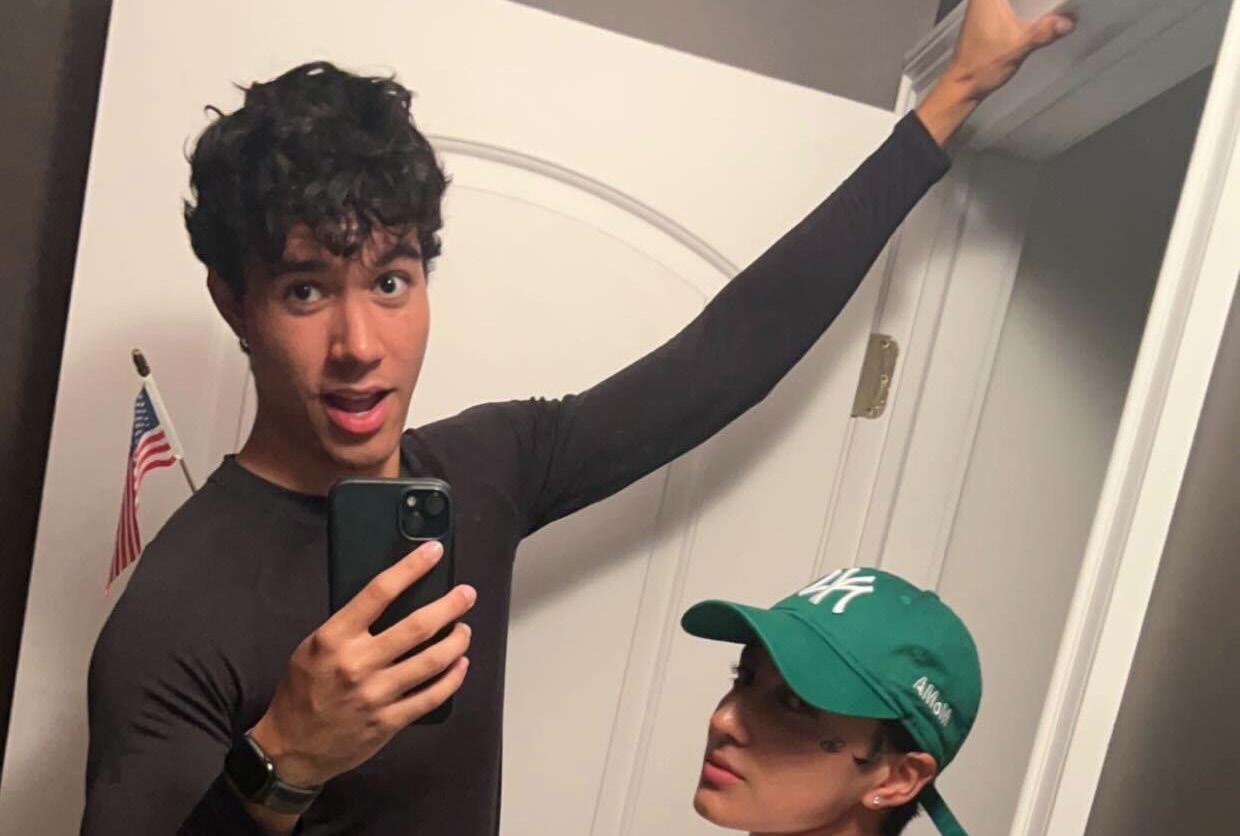









PHOTOSPREAD 7 TUESDAY, SEPTEMBER 5, 2023 THE TUFTS DAILY
From Beyoncé to Barbenheimer



FUN & GAMES F UN & G AMES 8 TUESDAY, SEPTEMBER 5, 2023 THE TUFTS DAILY
& G
Night
The Daily CROSSWORD SUDOKU CROSSWORD Difficulty Level: Moving into your fourth floor dorm. SUDOKU
1 7 8 9 6 7 4 5 1 1 2 7 9 5 7 6 2 8 2 9 5 3 8 1 4 7 9 2 1 1 Puzzle 1 (Hard, difficulty rating 0.69) Generated by http://www.opensky.ca/sudoku on Fri Sep 1 18:58:08 2023 GMT. Enjoy! Meghna: “This office makes my hair greasy and my stomach hurt.”
F
Late
At
LAST WEEK’S SOLUTIONS:
Letter from the Editor in Chief: Welcome back, Jumbos
To the Tufts community, Whether you’re returning to campus or stepping foot on the hill for the first time, it’s my pleasure to welcome you home.

It’s traditional for the editor in chief of The Tufts Daily to introduce our paper and offer words of welcome and wisdom, but since you’re certain to hear plenty of advice during the first few weeks of the school year, I’ll keep this letter brief.
To the newest Jumbos, the Class of 2027, first and foremost: Congratulations! To get here, you navigated not just one of the toughest admissions cycles in history, but a high school experience dominated by COVID-19 to finally arrive at one of the top universities in the world.
Right about now, you’re probably feeling a mixture of excitement, anxiety and exhaustion. Who can blame you? Essentially overnight, you’re expected to find new friends, begin classes, join clubs and figure out how to use the Boston public transit system (you’ll get the hang of it eventually).
You may find yourself — as I did — grappling with the dismaying feeling that, somehow, everyone else has it all figured out: Fellow first-years have already found their life-long friends, classmates managed to score prime summer internships, high-school peers seem to be out partying every night, all while you’re feeling a sense of deep uncertainty about what comes next. But here’s the
truth: None of those people actually know what they’re doing, either.
This is all to say, resist the urge to compare yourself — socially, academically and in all other ways — to anyone else. College is hard enough without wondering whether you’re doing it right. You are — we all are. (And you aren’t — we all aren’t.)
And remember, you’re not the only one new to campus; our president is starting his first year on the hill, too!
To President Sunil Kumar, congratulations on your historic appointment. As you’ve surely experienced, Tufts is a community unlike any other; we Jumbos are inquisitive and infectiously kind-
hearted. When we work together as a herd, even the most formidable challenges are no match for us. We’re excited to have you with us, and we’re rooting for your success.
Finally, it’s a pleasure to introduce you all to the Daily, Tufts’ student-run, financially independent newspaper of record. Since 1980, we’ve been covering stories large and small from across Tufts’ four campuses, from breaking news to long-form features and even a video tour of the president’s house.
Over the years, we’ve made it our mission to adapt to suit the ways our community consumes news, introducing video and audio sections and expanding our presence on social media. In
that spirit, I’m excited to share that the Daily has a new website. Many semesters in the making, it isn’t just prettier than the old version — it’s more functional, too, allowing us to deliver a higher caliber of journalism as we make multimedia more central to our reporting.
If you’re similarly passionate about storytelling, I encourage you to join the Daily. Anyone can get involved, regardless of experience, by sending us an email at daily@tuftsdaily.com, attending one of our general interest events or visiting our recruitment site, tuftsdaily.com/join-us. And if you’re looking for a platform to add your voice to the campus
conversation, send an op-ed to our opinion editor at opinion@ tuftsdaily.com.
While we strive to tell stories as accurately and fairly as possible, we sometimes make mistakes. If you read something in our paper you disagree with, or notice there’s an important story we aren’t covering, I invite you to send a letter to the editor or leave us an anonymous tip.
Finally, I hope you’ll follow along with our coverage this semester, in print on Thursdays and online Monday through Friday. While none of us at Tufts may know exactly what we’re doing or where we’re going, the Daily is always here to help the Tufts community figure it out.
On behalf of the Daily staff, welcome to Tufts.
Pax et lux,
Aaron Gruen Editor in Chief, Fall 2023
Clean your room
Hidden among the antiwoke ramblings of a psychology professor turned right-wing commentator lie a few decent ideas. Very few of them concern politics; Dr. Jordan Peterson believes in a “crisis in masculinity,” feels that academia is dominated by an oppressive culture of “postmodern neo-Marxists,” which is a fairly blatant oxymoron, and doubts the science behind climate change. However much you may disagree with these stances, these facts alone don’t disqualify Peterson from being a legitimately well-respected psychologist with occasionally interesting and applicable ideas.
As the new year of college begins, especially for those
beginning their first year at Tufts, it may be helpful to remember Peterson’s principle of the importance of cleaning your room. He doesn’t exactly mean it literally; it’s meant to be a metaphor for taking control of your life. Before you solve any larger issues plaguing you, you can start by simply cleaning up your room. The logic of this is very reasonable.
It’s easy to feel overwhelmed when facing many areas of dissatisfaction with one’s life, but those with fewer problems to deal with might be able to find more peace of mind, so concrete steps towards that are helpful. The trouble, however, with cleaning your room is that although the end goal of feeling some semblance of control in your life is easy to recognize as valuable, the
means to achieving this feeling are variable.
The ironic reality of the situation is that, as seen in Jordan Peterson’s video background, his actual room appears to be quite filthy. Although I certainly can’t personally criticize Peterson given the state of my dorm room last year, it’s important to recognize that cleaning your room means different things to different people. While some people might not be able to fall asleep with piles of dirty laundry on their floor, others might find more peace of mind in simply going to sleep and hopefully finishing their laundry later. The goal is not actually having a perfectly clean room; any close examination of a self-help guru’s life will prove this is unlikely. Rather, the goal is simply feeling as though your room is clean
and having a sense of control over your life.
The beginning of college comes with quite a bit more freedom than high schoolers typically experience, and as the philosopher Søren Kierkegaard reminds us, anxiety is “the dizziness of freedom.” It is standing atop a tower and feeling the tremendous fear that your only decision is whether or not to jump. Looking down from such a great height, it might seem impossible not to fall. However, it is also possible to look out and, for a moment, enjoy the view. Once you feel enough control, the decision to jump won’t feel like free fall. Thus, the importance of cleaning your room is that you can only land on the floor of complete freedom once your mind is strong enough that it doesn’t believe the fall will kill you.
As I have argued, cleaning your room requires a certain amount of self-knowledge, and it’s up to you to search for what makes you feel as though your life is quite alright. Perhaps at college, it will be getting at least eight hours of sleep every night, working out in the very crowded Tufts gym or even writing armchair philosophy for the Tufts Daily. Making strides towards life improvements beyond simply cleaning your room will require you to make that anxiety-ridden leap on your own. If you are a student beginning your college journey, you will likely receive no shortage of life advice, but the vast majority of the advice will be worthless. Jordan Peterson’s own advice has done little but resonate with incels. Instead, recognize that the journey is yours alone, and you can start by cleaning your room.
The Tufts Daily is a nonprofit, independent newspaper, published Monday through Friday during the academic year, and distributed free of charge to the Tufts community. The content of letters, advertisements, signed columns, cartoons and graphics does not necessarily reflect the opinion of The Tufts Daily editorial board.
EDITORIALS: Editorials represent the position of The Tufts Daily Editorial Board. Individual editorialists are not necessarily responsible for, or in agreement with, the policies and editorials of The Editorial Board. Editorials are submitted for review to The Tufts Daily Executive Board before publication.
VIEWPOINTS AND COLUMNS: Viewpoints and columns represent the opinions of individual Opinion editors, staff writers, contributing writers and columnists for the Daily’s Opinion section. Positions published in Viewpoints and columns are the opinions of the writers who penned them alone, and do not necessarily represent the opinions of the Daily itself. All material is subject to editorial discretion.
OP-EDS: Op-Eds provide an open forum for campus editorial commentary and are printed Monday through Thursday. The Daily welcomes submissions from all members of the Tufts community; the opinions expressed in the Op-Ed section do not necessarily represent the opinions of the Daily itself. Opinion articles on campus, national and international issues should be 600 to 1,200 words in length and submitted to opinion@tuftsdaily.com. The editors reserve the right to edit letters for clarity, space and length. All material is subject to editorial discretion and is not guaranteed to appear in the Daily. Authors must submit their telephone numbers and day-of availability for editing questions.
ADVERTISEMENTS: All advertising copy is subject to the approval of the editor in chief, executive board and business director.
OPINION 9 TUESDAY, SEPTEMBER 5, 2023 THE TUFTS DAILY O
PINION
Maxwell Shoustal Deputy Opinion Editor
VIEWPOINT
NICOLE GARAY / THE TUFTS DAILY President’s Lawn is pictured on Aug. 8, 2020.
“WHEN WE WORK TOGETHER AS A HERD, EVEN THE MOST FORMIDAB l E CHA ll ENGES ARE NO MATCH FOR US.” -AARON GRUEN
Learning from our mistakes: The Tufts housing crisis, re-examined
 Kevin Golub Staff Writer
Kevin Golub Staff Writer
“History repeats itself, first as a tragedy, second as a farce.”
— Karl Marx
“According to housing director John Darcey … the university looked seriously into housing freshmen in nearby HOTELS (i.e. Sheraton Commander in Cambridge), or possibly purchasing new CONDOMINIUMS for the overflow. ‘We have the money to do it,’ he said.”
This quote from a Tufts Daily article appears to capture the Tufts housing crisis quite accurately. So would it surprise you that the quote above is from 1987? Tufts has been dealing with housing issues for decades and many of the root causes persist today. But to understand the true nature of the Tufts housing crisis, we have to go all the way back to 1977.
Jimmy Carter is President of the United States and Fleetwood Mac is relishing the success of “Rumors.” After a long day of classes and studying in the library, you decide to head back to your dorm for the evening. Instead of going to Haskell or Harleston like your friends, you have to travel 2.5 miles back to your dorm: the Sheraton Commander in Cambridge.
The 160 Tufts students who were forced to live in the Sheraton Commander in the fall
of 1977 complained about the long commute to the Tufts campus. As the Harvard Crimson reported, the underlying issue was over-enrollment, a problem not unique to Tufts.
Despite valiant attempts to normalize hotel living, students were dealt another blow: On March 23, 1979, the Tufts Observer reported that over spring break, several rooms in the Commander were burglarized with around $3,500 worth of items stolen. Nonetheless, students continued to live in the Sheraton Commander through 1980.
Ten years after first housing students in the Sheraton Commander, Tufts faced another housing crisis. Doubles were converted into triples, causing rooms to feel overly cramped. An unnamed student explored the university’s infelicitous approach in “A Modest Proposal,” a Swiftian opinion piece (quoted at the beginning of this article) published in the Sept. 3, 1987 edition of the Tufts Daily. The author went on to propose converting upperclassmen on-campus housing to first-year housing so that “ the entire freshman class can enjoy the healthful benefits of dorm life.”
In 2021, 100 freshmen lived in the Hyatt Place in Medford Square. Students expressed frustration with the unreliable shuttle and absence of commu -
nity; however, when pressed on whether Tufts was in the midst of a housing crisis, Josh Hartman, then-senior director of residential life and learning, denied the allegation, citing other schools’ housing issues as well as the use of hotel space as a “common solution in these situations.” Of course, Hartman’s assertion is intellectually dishonest. He claims that hotel housing is appropriate because other universities do the same, but disregarded any potential impact on students. (As an aside, I hope Hartman does not assume responsibility for coaching the debate team any time soon.)
Defaulting to hotel rooms to address a housing shortage is not a well thought out student-oriented solution. It is a quick fix built on years of institutional laziness.
For decades, Tufts has accepted more students than it can appropriately house in dorms, and a high experiential toll has been paid by the students affected. I am left wondering how university administrators sleep well at night in their expansive residential homes knowing that they’ve assigned students to sleep in hotel rooms, or for that matter, modular pre-fabricated boxes constructed on a tennis court. Make no mistake: the Tufts housing office isn’t entirely to blame for this situation. The
issue of housing at Tufts is also one of poor planning, and the problem is not just over-enrollment (whether intentional or due to failed algorithms), but a failure of governance.
History repeats itself. Tufts has experienced housing crises for more than 40 years. Whether renting out space in hotels, converting double rooms into triples or building makeshift structures on athletic spaces, there is no denying that Tufts’ housing situation is in dire straits. And yet, housing administrators deny it. Worst of all, after witnessing the problem for decades, administrators should have had the time to construct solutions. They did not do so.
The construction of new academic buildings before new dorms suggests Tufts
leadership prioritized other matters over student living. This may satisfy some, but it borders on cruel, given the social impact on students, and the fact that such impact could have easily been avoided with proper planning and resource deployment.
The similarities between the housing of students in the Sheraton Commander in 1977 and in the Hyatt Place in 2021 are uncanny. Perhaps one can debate the precise causes of failure and who is responsible, but the facts on the ground compel the conclusion that Tufts has failed to provide adequate housing. At the end of the day, we need to more closely examine and change important elements of leadership and governance that impact students.
Women legislators are working together to support women across the Commonwealth
We are facing many challenges in Massachusetts. I continually hear from families and individuals around Somerville and Medford who are having trouble affording basic needs, worrying about health care and fearing their rights for themselves or their children.
One of the ways that I focus on solutions to the urgent needs of our communities is by serving in the leadership of the Massachusetts Caucus of Women Legislators. By working with other women leaders in the House and Senate, the Women’s Caucus provides a place in the State House where we support each other and find new ways to work together to solve problems.
As Vice Chair of the Caucus of Women Legislators this session, I work with a group of 63 state representatives and senators who identify as women from both parties. We set priorities together to support women as we navigate out of the pandemic and seek to meet needs, including elevating women’s economic opportunity and eliminating barriers; addressing racial and gender disparities in health care; and empowering women in government. While we do not always
agree, as a group we find common ground to work on each of these larger issues to address the major challenges we face in Massachusetts.
Women continue to face limitations in economic stability, and we know the pandemic disproportionately affected women’s economic well-being and ability to remain in the workforce. Our priority of elevating women’s economic opportunity and eliminating barriers builds on the Caucus’s work of last session that mainly focused on child care, particularly ensuring that the childcare workforce — primarily women — has wages and the support to remain and grow in that career. This legislative session, the Women’s Caucus is supporting a bill to increase rates for human service workers, who care for elders and people with disabilities, critical workforces often staffed by BIPOC women, who are in need of better pay and greater protections. These jobs employ mainly women and also help women to work outside of the home.
Despite work in this area, women continue to earn less than men for the same positions. The Women’s Caucus has endorsed a bill I filed on pay equity, H.1940: “An Act relative to transparency in the
workplace.” This bill requires certain employers to submit wage data reports to the state Office of Labor and Workforce Development that include information on employees’ job title, ethnicity, gender identity and compensation — with the ultimate goal of advancing transparency in pay in the workplace. This is an important step in addressing pay inequity in Massachusetts.
Women of color continue to face disparities in access to affordable health care, which is the focus of the Women’s Caucus priority to address racial and gender disparities in health care. For example, the maternal mortality rate for Black women is over three times higher than for white women. The Caucus is prioritizing a number of bills to support maternal health, including one enhancing post-pregnancy mental health care and one providing Medicaid coverage for doula services.
In addition, one of the Women’s Caucus top bills is one I filed, H.534: “An Act to increase access to disposable menstrual products in prisons, homeless shelters, and public schools” to provide equitable access to menstrual products. Inspired by organizing by Somerville and Medford students to push for
free menstrual products in their schools, this bill would ensure menstrual products are free and accessible in all schools, prisons and jails and homeless shelters.
Finally, we have made historic gains in electing women in Massachusetts, electing the first female governor and lieutenant governor in the country. But despite these wins, women remain a minority in elected office nationally, in Massachusetts and at the local level. Our priority of empowering women in government seeks to continue to build support for women’s leadership opportunities and ability to run for office at all levels of government. Last session, we passed a Caucus bill to create a Women’s Rights History Trail to highlight women across the Commonwealth who have contributed to our shared history through women’s rights and suffrage, and continue to inspire new leaders. This year, we continue to prioritize a bill that would enable people running for office to use their campaign funds to pay for child care.
Women have made gains, but there is still much more to do. The Caucus of Women Legislators was founded in 1975 by the 14 women who served in the Massachusetts House of Representatives.
I was the 188th woman ever
elected to the legislature in Massachusetts. There have now been a total of 234 women elected, as we have continued to make gains over the last decade. But when you consider that over 20,000 men have served in the Massachusetts State House over the years, it illustrates the slow trajectory of our progress.
When the US Supreme Court’s decision to overturn Roe v. Wade threatened women’s health access and economic opportunity last year, women in the State House loudly pushed back to ensure that Massachusetts continues to provide access to needed health care and reproductive freedoms. Even as we comprise just over 31% of members of the House and Senate, we are continuing to lead on the most critical issues facing our communities.
Despite the challenges we face, we continue to make progress — both in electing more women and seeing women in leadership positions, and also in tackling major issues in economic equality and health care. Working together alongside other members of the Caucus of Women Legislators, I am hopeful we can make the strides necessary to continue enhancing the lives of women and girls in our Commonwealth.
OPINION 10 TUESDAY, SEPTEMBER 5, 2023 THE TUFTS DAILY VIEWPOINT OP-ED
RACHEL LIU / THE TUFTS DAILY
State Rep. Christine Barber
The Court at Professors Row is pictured on May 9.
Tom Brady invests in Birmingham City
Bharat Singh Sports Editor
From “Black Panther” (2018) and “Creed” (2015) star Michael B. Jordan investing in A.F.C. Bournemouth to the sensational takeover of Wrexham A.F.C. by Hollywood duo Ryan Reynolds and Robert McElhenney, American investments in English football have become increasingly common in the last decade. Such celebrity financing is not limited to elite clubs and can be transformative
joined golf star pair Jordan Spieth and Justin Thomas as investors in Leeds United.
In August, Tom Brady became the latest star-turned-investor as he partnered with Knighthead Capital Management LLC, which bought 45.64% of Birmingham City Football Club. The American investment firm also purchased the club’s iconic St. Andrew’s Stadium, with plans for major renovation in the works. Despite being England’s second biggest city, Birmingham has struggled to establish a formidable lega-

Nathan Redmond and Everton’s Demarai Gray. Despite such players, their greatest academy creation is none other than Real Madrid’s newly signed midfield anchor, Jude Bellingham. Bellingham leads La Liga with five goals in his first four games for Los Blancos, joining fivetime Ballon d’Or winner Cristiano Ronaldo as the only player to score in the first four games in the Spanish first division season.
Such talent is proof of the healthy academy ecosystem that exists at the club. But producing
sive leadership experience” when working with “the sports science department to advise on health, nutrition, wellness, and recovery systems and programs.” His promotional value, however, cannot be overlooked.
The seven-time NFL champion is worshiped in the United States with his popularity slowly spreading through Europe and Asia in the last decade. On Instagram, Brady has 14.3 million followers. That might seem low in comparison to other global stars, but Birmingham City
know a few things about winning, and I think they may translate pretty well.” Brady also discussed being the underdog and how it motivates him more. Birmingham is in need of a vision and Brady seems to believe it.
Tom Wagner, co-founder of Knighthead Capital and new club chairman, said that by bringing Brady into the club, “we are setting the bar at world class,” further explaining how he will serve as a chair on the advisory board working to improve both the men’s and women’s programs.
for those hoping to climb the footballing pyramid.
Similar to the Hollywood elite, American athletes have also shown interest in English teams. LeBron James currently owns 2% of Liverpool F.C., a club whose value has skyrocketed in the last decade, while J.J. Watt, American football star and former NFL defensive end, owns a minority stake in the recently promoted Burnley. Russell Westbrook recently
Henry Blickenstaff Extra Innings
The Ohtani dilemma
After a long summer spent thinking about baseball (among other, less important things), it’s only right to start off this year by talking about the first man that comes to mind when talking about baseball these days: Shohei Ohtani.
The word “unique” doesn’t do Ohtani justice. He is the first full-time two-way player since Babe Ruth himself, who only did both for two seasons. Ohtani’s been one of the best hitters in baseball this season, slashing .306/.413/.658 and posting a 1.070 on-base plus slugging. His slugging percent-
cy for its namesake in the Premier League. Their intercity rivals Aston Villa, however, are enjoying their fifth consecutive season in the first division. Birmingham’s last season in the top flight was in 2011 and they have since struggled in the Championship League. In terms of youth development, Birmingham has produced several exciting Premier League players, including the likes of Burnley winger
age and On-base Plus Slugging are the best in baseball, as are his 44 home runs. As for his work on the mound, he has pitched to a 3.14 earned run average with 167 strikeouts in 132 innings this season. Add it together and you have a leaguebest 10.1 wins above replacement.
Either one of those stat lines by itself would be enough to merit a large payday in free agency, which Ohtani will enter at the end of the 2023 campaign. But put them together in the same package, and you have the ingredients for a record-breaking contract, projected to be worth upwards of $500 million.
Unless you’ve been living under a rock, you’ll know that Ohtani recently tore his ulnar collateral ligament, an injury common to pitchers but one
one-off talent every few years does not guarantee promotion, especially when those players are often sold to raise transfer funds. Knighthead and Brady’s partnership will be focused on investing in academy facilities, funding high-caliber recruitment and generating media revenue for the club, the latter being Brady’s forte. The club stated that Brady’s role will allow him to “apply his exten-
that usually requires Tommy John surgery, which takes upwards of a year to recover from. He will not pitch again this season but will continue to hit.
This confirms the biggest fear about a mammoth Ohtani contract: pitching injuries. While Ohtani has been very effective as a pitcher, it’s a small sample size — he’s thrown less than 500 innings in six years as a big leaguer. He’s also already had Tommy John once before, and didn’t pitch at all in 2019 while recovering.
Ohtani is faced with a difficult question — does he even bother with another Tommy John? If he chooses to undergo the surgery, he won’t pitch at all in 2024 and will miss some time as a hitter as well. But if he opts to stop pitching all together, he becomes a mere mortal and kills much of his potential value.
alone has 251 thousand. America is an attractive market for any soccer venture as it prepares itself to host the World Cup alongside Canada and Mexico in 2026. Lionel Messi’s recent arrival to the MLS at Inter Miami is another indicator of the nation slowly falling for the magic of the beautiful game. In his announcement video, Brady admitted that he has much to learn about English football but stated: “I do
There’s a good argument that Ohtani deserves $40 million a year on his merits as a hitter alone. If he asks for upwards of $60 million, many teams will be reluctant to take the chance that he’ll recover as a pitcher, because if he doesn’t, that contract will drag them down for years to come, no matter how well he hits (within reason). But the potential upside if he does return and pitches well is impossible to ignore.
I’m sure I’ll catch some heat for this, but if Ohtani undergoes Tommy John and looks for a long-term deal worth what he was supposed to get before the injury, teams looking to find their franchise player in free agency should skip on Ohtani this year and pursue Juan Soto next year, provided the Padres don’t extend him before then. Soto’s ungodly combination of
Birmingham City is currently fourth in the Championship and is still unbeaten. A late penalty from Lukas Jutkiewicz against recently relegated Leeds United stands out as the highlight of the campaign so far. Brady’s arrival and the vision set for the club has Birmingham buzzing again, as the Blues hope to bounce back to the Premier League.
plate discipline and power has drawn comparisons to Barry Bonds. Soto has a career OPS of .939, is still just 24 years old and will cost far less than Ohtani in this scenario.
For my money, the risk that Ohtani won’t return to the mound is just too great to take on such a contract, especially if it’s a long-term deal. But my opinion could change if he seeks less money or a shorter contract. One thing is certain, however: Ohtani has proven a lot of doubters wrong in his career. And if I’ve learned anything from playing and watching baseball my entire life, it’s that this game is anything but predictable.
SPORTS 11 TUESDAY, SEPTEMBER 5, 2023 THE TUFTS DAILY
Henry Blickenstaff is a junior studying history. Henry can be reached at henry.blickenstaff@tufts.edu
VIA WIKIMEDIA COMMONS
Tom Brady in 2017.
Men’s soccer grows hopes for a return to hardware this season
Spencer Rosenbaum Deputy Sports Editor
It was a cold November day in Oneonta, New York when SUNY Oneonta halted the 2022 men’s soccer team’s season in the second round of the NCAA Division III
find the back of the net. In a year of men’s soccer that was defined in part by a new NCAA rule that outlawed overtime in regular season play, the Jumbos — along with many other squads, especially those in the high-performing NESCAC — fell victim, fea-

Daly graduate — the development of these players provides something to be incredibly excited about going into the coming season. Sophomore outside back Mateo Bargagna, who played as a forward last year, discussed how the Jumbos’ options at fullback have worked to fill the void
University and first-year Zach Ubamadu, all of whom will compete for the starting role.
Ubamadu is a member of an extremely strong first-year class that features forward Zack Salfi, forward Xavier Canfin, forward Sandy Duggal, midfielder Bijan
This class may help resolve the squad’s goal-scoring issues from last season.
“I’m seeing a lot of good ball-strikers and a lot of shiftiness up there, so if we can keep that going and put the defenders on their butts, we’re going to be straight,” Bargagna said.
On Wednesday Sept. 6th, Tufts will kick off its 2023 campaign, hosting Massachusetts Institute of Technology on the brand new Bello Field at 7 p.m. That will begin an 11 day stretch where the squad has a whopping total of five games.

“Obviously, we want to play hard, but we [have] to keep our bodies good and stay smart with minutes and recovery … my mentality is to stay consistent and strong throughout the season, so we can continuously perform every weekend and hopefully win a lot of games,” Bargagna said.
Managing an entire season’s volume of games requires extreme personal care, and this workload on players’ bodies is actually the reason that the NCAA cites for its removal of regular season overtime. But it is important not to confuse personal care with hard work; the Jumbos certainly do both.
Tournament by a score of 2–0.
The Jumbos’ program is renowned for being one of the best in Division III Men’s Soccer, highlighted by four national championships in the last ten years. Throughout last year’s season, the Jumbos kept up with their reputation of playing high-level soccer, yet struggled to match their lofty standards of success in the form of wins, partially due to an inability to
turing a staggering seven ties in their 8–3–7 record.
Nonetheless, the squad was undeniably underclassmen-heavy, with first-year and sophomore players recording significant minutes. Even with the departure of some major talents — including having sophomore starting goalkeeper Erik Lauta transfer to Division I powerhouse, No. 19 University of New Hampshire and last year’s senior outside back and All-American Ian
that the program has without Daly.
“Very, very big shoes to fill … fullbacks are very important for our system because they do a lot of running … as a whole fullback couple of guys we’re very ready to work and do the best that we can to help the team,” Bargagna said.
At the goalkeeper position the squad has two newcomers in addition to sophomore Sammy Kao: sophomore Nikola Antic, who transferred from Northeastern
Akhtarzandi-Das, defender Ethan Jett, midfielder Ben Brown and midfielder Demir Calkap. With this class, the Jumbos will hope to find the pieces they were missing last year. Bargagna commented on the class as a whole.
“[They’re] pretty funny and clumsy sometimes, but everybody came in for preseason and prepre ready to work hard, extremely determined to have a great season,” Bargagna noted.
“I think we have really good work ethic, and our team is still pretty young. Some people could see that as a negative, but for us, we’ve got a lot of energy and dogs on the field that are going to work their [butts] off, and just play a good, 30-deep man roster,” Bargagna said.
These strengths — work ethic, youth, energy and depth — will be crucial in this coming season. If the Jumbos can put things together, particularly in the final third of play, then we could see the team of success and championships that we are used to seeing in Medford again.
SPORTS 12 TUESDAY, SEPTEMBER 5, 2023 THE TUFTS DAILY SPORTS
SOPHIE DOLAN / THE TUFTS DAILY
Tufts Mens Soccer plays Hamilton at Bello Field on October 3rd, 2021.


















 Odessa Gaines Arts Editor
Odessa Gaines Arts Editor

















 Kevin Golub Staff Writer
Kevin Golub Staff Writer


